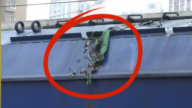【新唐人2011年10月27日讯】受美国和欧洲经济不景气、中共政府宏观调控导致的资金供给紧张等因素影响,几个月来,珠三角的企业倒闭现象蔓延。中小型的传统劳动密集型企业首当其冲,而高科技企业也无法置身事外,在完成2011年最后一批订单后,“倒闭潮”可能一触即发。
继温洲企业出现大规模倒闭潮之后,珠三角也陷入了危机,不少企业资金周转不灵,又一次引发工人集体罢工,或是追讨欠薪。
从这个月17号起,日本品牌手表西铁城(CTIZEN)在深圳的代工厂冠星精密表链厂,有1178名员工因工资、社保、公积金等问题集体停工一周,要求资方支付相关经费。
而经营了22年的佛山市南海塑料龙头企业“东方塑料制品有限公司”在今年8月突然倒闭,老板孔泳其出走纽西兰,上千名工人一夜之间失业。8月20号,工人们涌上金沙大桥,导致大桥堵塞长达一小时,直到当地政府答应发放工资。
东方塑料正像珠三角很多企业缩影。今年6月、7月,拥有2000多名员工的东莞定佳针织服装、素艺玩具两家公司连续倒闭。素艺玩具老板拖欠巨额工人工资逃跑。7月26号,中山拥有1300多名员工的中合鞋厂也宣告停产,遣散全部员工。
据中财网报导,广东中山三个乡镇每周都有一两家企业静悄悄的倒闭,多为中小加工厂。由于它们没有品牌,没有影响力,甚至有些企业根本没有注册,因此它们的倒闭破产从来没有进入政府有关部门的视线。
香港中小企业联合会会长刘达邦表示,最近五年珠三角都在走下坡,08年金融风暴,淘汰了3000-4000家企业,而目前的情况也不乐观。
香港中小企业联合会会长刘达邦:“全年保守估计,2011年有一千到两千家港企停产,因为它倒闭需要一定的时间。虽然没有金融风暴那时那么伤,因为那时银行是立即关水喉。08年是停单或者减单,今天是迟迟才下订单,最大的困境就是没单,订单少了,生产成本上涨,人民币升值,原材料上升,这些都是对生产造成一个很大的困局。”
中共政府宏观调控导致的资金供给紧张造成企业流动增加,也给地方政府带来了困境。
香港中小企业联合会会长刘达邦:“五年前已经开始鼓励转移转型,这个中央下来省执行,但当然不是市,市不是很想你走,特别镇,可能他们镇的发展都是靠这些企业撑着,因为他没有服务业,他们基本上没有服务业,都是依赖这班厂家在这里投产。”
原物料直线上涨,劳动成本也节节上升,这次珠三角倒闭潮,就有5万家香港企业受到影响,预计到年底,有1000到2000家会歇业或倒闭。到底,有没有解决办法呢?
香港中小企业联合会会长刘达邦:“解决办法就是你开源节流,你想办法拿订单回来,你做些内销。你外国订单不够的话你可以考虑做些内销,做一部分的内销,但你做内销要小心……这个第一点,你没卖之前要搞清楚税务问题,第二点就是关于你卖给人,如果你直销的话,你收了钱那就没问题,但如果你要赊账给人家的话,你就要小心你收不回来钱。”
据国内媒体的调查,4个月前,当“倒闭潮”传言从温州入侵珠三角的时候,虽然当时企业已经连声叫苦,但中等以上规模企业的倒闭和停产,在珠三角还是孤立的个案。但目前,规模偏大、历史相对久远的企业接连倒闭和停产。而很多珠三角中小企业虽然都在苦苦硬撑,但随着订单量下降、成本上升等问题的加剧,在完成 2011年最后一批订单后,一触即发的“倒闭潮”将是政府和企业不得不面对的最严酷的现实。
新唐人记者梁珍、尚燕、柏妮采访报导。
Business Closures Skyrocket In Peale River Delta
Business failures are quickly spreading in the Pearl River Delta,
sparked by the economic downturn in the U.S. and Europe
and the Chinese Communist Party’s (CCP) macro-control
of the money supply in China, over the past few months.
The traditional labor-intensive small and medium enterprises
will be the first to be affected, with high-tech companies to follow.
After completing the last batch orders in 2011, business closures
may be imminent.
Following the large-scale business closures in Wenzhou,
businesses in the Pearl River Delta also experienced a crisis.
Many companies don’t have an adequate cash flow,
triggering strikes, and often times, wage claims.
On October 17, at the Crown Star Precision Bracelet factory
in Shenzhen, which makes the Japanese brand Citizen watches,
1,178 employees stopped working for one week,
due to issues relating to wages, social security, provident funds,
and others, including asking employers to pay related expenses.
The 22-year-old Foshan city plastics company,
Eastern Plastics Co., Ltd. suddenly closed its doors on August 2011.
When its main boss, Kong Yongqi, escaped to New Zealand,
thousands of workers became unemployed overnight.
On August 20, workers occupied the Sands Bridge,
leading to a one-hour traffic jam until the local government agreed to pay the workers their wages.
Eastern Plastics Co., Ltd is a microcosm of many companies
in China.
In June and July, the Dongguan Dingjia Knitwear and
Suyi Toys, which once employed over 2,000 workers, closed down, one after the other.
The main boss of Suyi Toys escaped since he owed a huge
amount of wages to his workers.
On July 26, the Zhonghe Shoe Factory,
which employed 1,300 workers, suddenly stopped their operation and dismissed all of their workers.
According to three townships in Zhongshan,
one or two mostly small and medium plants,
quietly close down their operations every week,
Since some companies do not produce brand name products,
lack influence, or are not state registered companies,
they quietly collapse into bankruptcy
hardly bringing attention to themselves from
relevant state and city departments.
Liu Dabang, director of the Hong Kong Federation
of Small and Medium Enterprises (SME),
had recently said in the past five years,
the Pearl River Delta economy had been declining.
The 2008 financial crisis eliminated 3,000 to 4,000 companies,
and the current situation is not looking optimistic either.
Liu Dabang, director of the Hong Kong Federation of SME:
“A conservative estimate of 1,000 to 2,000 Hong Kong enterprises
would go out of business, though it is not as serious as
in a financial crisis where a bank would immediately cut
the water supply of the business
In 2008, orders were cancelled; today orders are slow.
The greatest problem is no orders.
With less orders, production costs increase.
Then the companies have to deal with the RMB appreciation
and the rising cost of raw materials, which all directly effect production costs."
The CCP’s macro-control over the economy has caused
a shortage in cash supply, causing increased tensions
in mobility of enterprises, and bringing hardships
to local governments.
Liu Dabang: “Five years ago, the CCP had begun to
encourage a transfer of power from the Central Committee to province level officials.
But of course, the city doesn’t want these enterprises move out,
especially the town, where were propped up by these companies.
Because they did not have service business in the town, basically no,
their economy are all rely on these manufacturers or producers."
Raw materials and labor costs are continuously rising.
Due to the business closure trend in Pearl River Delta,
about 50,000 Hong Kong enterprises are affected.
This trend is expected to end in 2011.
About 1,000-2,000 businesses will go out of business or close down.
Is there any solution?
Liu Dabang: “The solution is to increase income, cut costs,
try to get orders in, and encourage domestic sales.
If foreign orders are not enough, then you can consider
going after domestic sales.
But you do have to be careful with domestic sales.
This is the first point: you have to figure out your tax issues.
The second point is: who do you sell to?
If you do charge them directly, there is no problem,
but if you credit them, be careful they will not pay you back."
According to a domestic media survey, four months ago,
When closure rumors flooded the Pearl River Delta from Wenzhou,
some companies often complained, but it was still rare
for medium size enterprises to close or stop production.
Recently, relative large and longstanding businesses failed,
one after another.
Many small and medium enterprises in the Pearl River Delta
held out in spite of their difficulties.
As orders declined and costs rose, after finishing the last batch
of orders in 2011,
the CCP regime and many enterprises have to face the fact
that many businesses will close their doors, forever.
NTD reporters Liang Zhen, Shang Yan and Bo Ni.





























